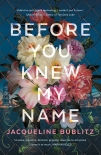Before You Knew My Name, Jacqueline Bublitz [best book club books for discussion txt] 📗

- Author: Jacqueline Bublitz
Book online «Before You Knew My Name, Jacqueline Bublitz [best book club books for discussion txt] 📗». Author Jacqueline Bublitz
‘Sometimes,’ Josh admitted, ‘I struggle with the fact that I survived. Have you ever heard of Cotard’s Syndrome?’—Lennie shook her head, no—‘Well, it’s quite the trip. There are people out there who think they are in fact dead. Living, breathing people who feel certain they have shuffled off this mortal coil, and they cannot be convinced otherwise, despite … well, despite all evidence to the contrary. People with this delusion essentially think of themselves as walking corpses, the dead amongst the living, and no amount of reasoning can change their minds. It’s a fascinating condition, but also terrifying. Because, since the accident, I’ve sometimes wondered if I’m not something of a walking corpse myself. Dead on the inside, you know?’
As Josh shared this startling confession in his matter of fact way, Lennie’s quiet, bird-boned neighbour fluttered into her mind. She had known Sue for years now, ever since the older woman’s Persian cat had claimed Lennie’s couch as her own, one windows-open afternoon. They were almost friends, close enough to share a wine or two on warmer nights, but up until now, Sue had steadfastly refused any overture that might formalise their relationship. Gallery openings, cheap Tuesdays at the local oyster bar, food festivals down on the water—Sue said no to every activity Lennie suggested, and then one night she said something more.
‘I’m sorry but I don’t live in the world like you do, Lennie. Not really. When my daughter died’—a car accident nearly twenty years ago, Lennie knew minimal details at the time—‘the best parts of me died, too. No one wants to spend time with a corpse, and rightly so. I’ve learned to do things on my own, and now I prefer it that way.’
Sometimes, you just know what is needed.
‘I have someone I want you to meet,’ Lennie told Josh that night over dinner, and she told Sue the same thing, the very next day. Exactly what to do with this coupling came in the middle of the night, when she remembered a man at the mortuary who had just lost his daughter, a young woman Lennie worked her magic on, carefully erasing gunshot wounds and finger marks, so that an open casket might be possible.
‘I don’t understand what this means, where she’s gone, and why I can’t go, too,’ this father had said to Lennie, sobbing into her shoulder. ‘God doesn’t answer me. And none of my friends will look me in the eye, let alone talk to me. Who am I supposed to talk to now?’
From this lament, the seeds of Death Club were planted.
We’ve each had our noses pressed up against death, Lennie wrote in her proposition. It’s this great big mystery, yet it clearly dictates how you—how we—live, at the same time. Maybe if we got to know it a little better, tried to understand it, we might find a way to break through the glass that separates life from death.
And who knows what we’ll find on the other side.
The other side. The place where you make sense of things. Where a daughter can die, and a body can return from the brink, and another comes in on a gurney, and people continue to wake up and eat and sleep and dream and love and fight and cry and conspire, as if their turn will never come.
Lennie finished off her earnest invitation with the same Poe quote she would send Ruby many months later, and an entreaty: Come explore the boundaries with me, please. It gets lonely out here on my own.
Isolation makes everything less strange. You find yourself agreeing to things you might otherwise scoff at when you are someone who has regular plans on Tuesday and Thursday nights.
‘I’m a misanthrope,’ Josh said.
‘I don’t want to meet anyone new,’ Sue complained.
But they agreed to that first meeting of Lennie’s so-called Death Club, all the same. The first question, explored over tequila at a bar on Bedford, felt like the click of a padlock releasing: Is death the end, or the beginning?
That was nine months ago. By the time Ruby sits down with the trio at an outdoor table on a tepid spring day near Central Park, the founding members cannot remember life without Death Club’s weekly, winding conversations. Neither philosophers nor debaters, these three very different people come with their questions and their musings, their common ground a place most other people avoid in polite, everyday conversation. Most meetings take the members far from where they started, and every meeting involves food and libations. In other words, the members of Death Club generally arrive sober and go home drunk.
(Perhaps the only thing they’ve never managed to agree on is the name—‘Death Club? Really, Lennie?’—but their founder has steadfastly refused to change it, which is something I can appreciate.)
‘Don’t expect anybody else to understand,’ Lennie advises Ruby with a smile, as she comes to the conclusion of Death Club’s origin story. ‘This is definitely not most people’s cup of tea. Not when we live in a culture that likes to pretend the most obvious things aren’t real if they’re the slightest bit unpleasant. Most people avoid talking about death, they find it confronting—or scary. And if they think they’ve found a way to reconcile their fears, through religion, say, they’ll go out of their way to shut down any questions that might threaten that safety. The only rule of Death Club, therefore, is that a hard question is more important than a simple answer. Until one of





Comments (0)